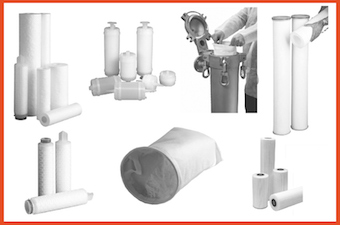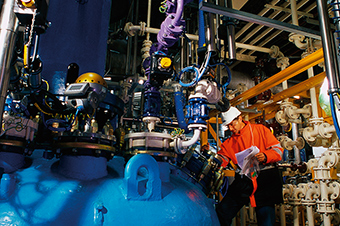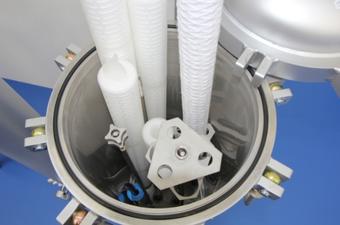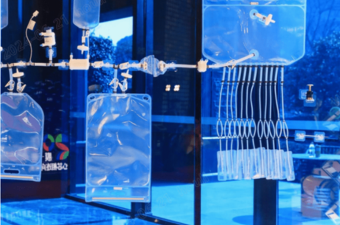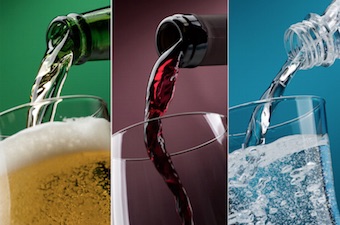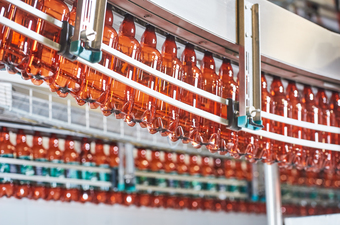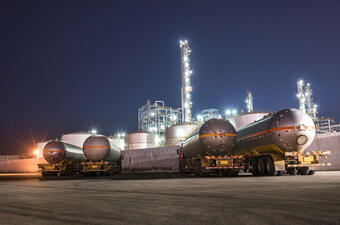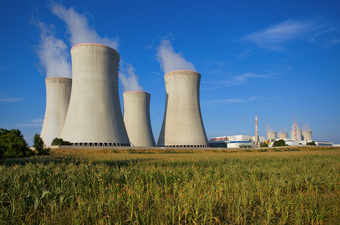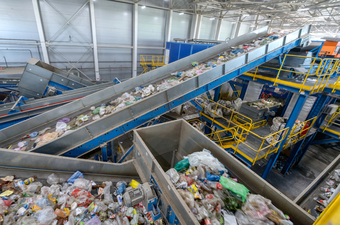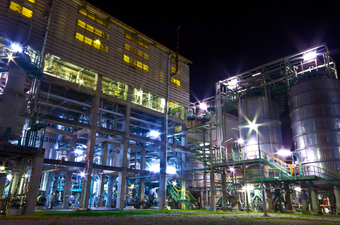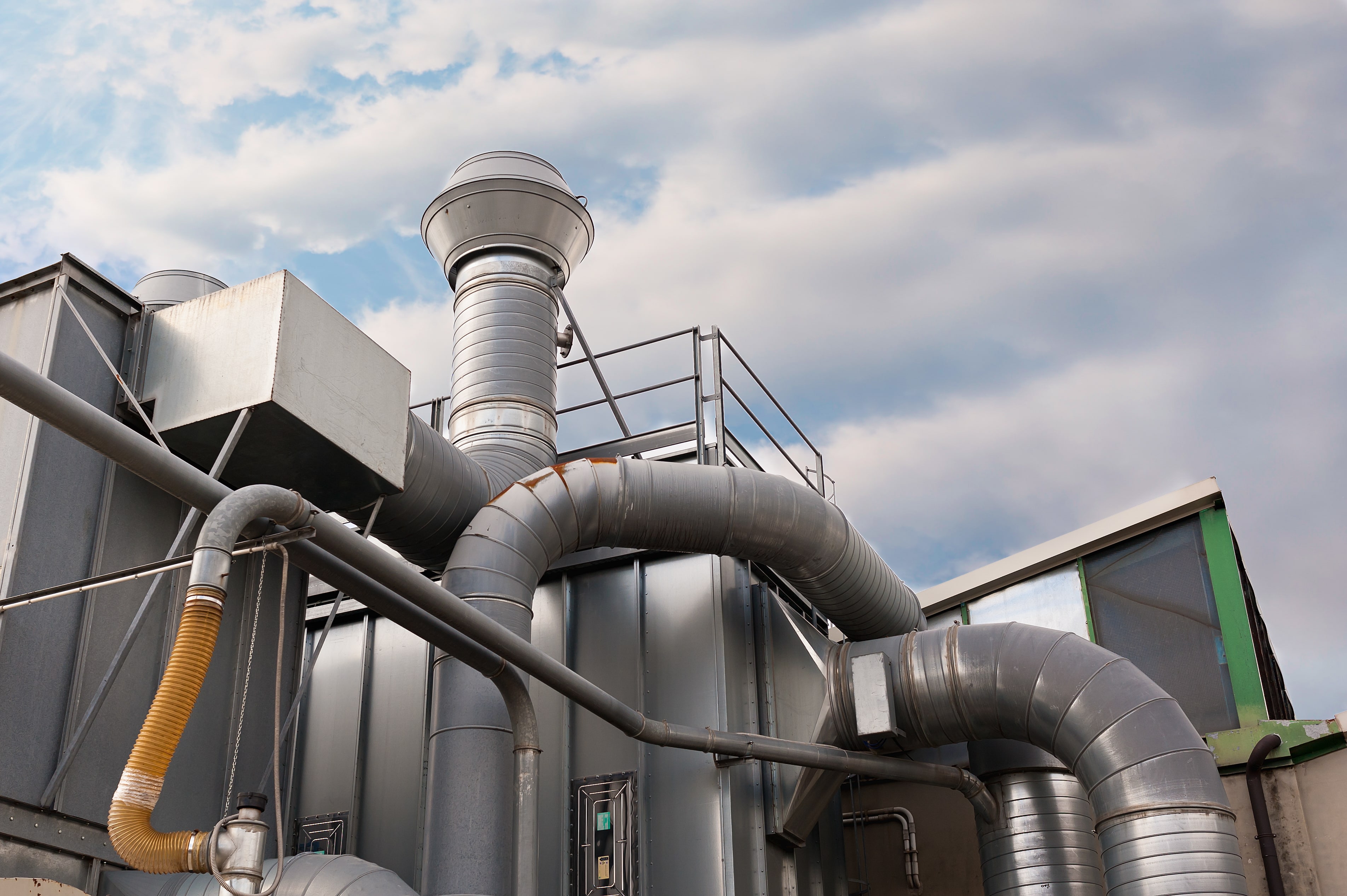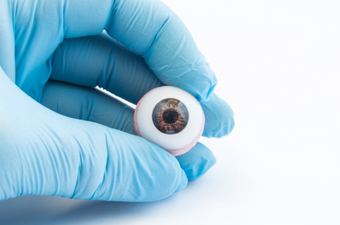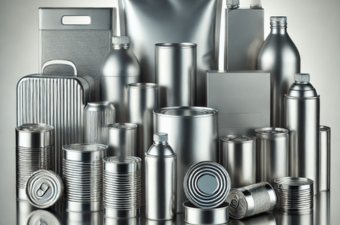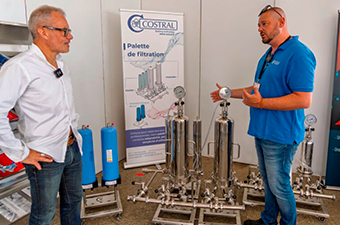Petrochemical industries use highly specialised filters to process chemically aggressive compounds, which are often highly viscous and maintained at high temperatures. Depending on the sector, the fluids requiring filtration vary greatly: oils, fuels, gases, as well as water and solvents. In oil refineries, the purity of the produced fuel is crucial. In the polymer industry, filtration devices are used from the introduction of raw materials into the intermediate reactor and at every stage of synthesis: polymeriser, mixer, extruder, etc. The substances to be filtered exhibit a wide range of rheologies (water, solvent, molten polymers) and diverse chemical compositions (polypropylene, polyester, polyethylene, etc.). In response to these filtration challenges, metal filters provide significant advantages.
From crude oil to fuels and plastics
In a refinery, crude oil is transformed into finished products in three stages: separation, conversion and upgrading.
The first step is to separate the molecules by distillation according to their respective molecular weights. To do this, the oil is heated to temperatures of around 350-400°C in a distillation tower, where it evaporates. The crude oil vapours rise in the tower, while the heavier molecules, also known as heavy residues, remain at the base without evaporating. As the vapours rise, the molecules condense into liquids, one after the other according to their size, on the ‘distillation trays’ distributed throughout the height of the tower. Only the lightest compounds reach the top of the tower, where the temperature is only around 150°C, in gaseous form. Each plateau corresponds to a distillation fraction, also known as a petroleum cut. At the base of the tower are the bitumens (the most viscous hydrocarbons), at the top the gases.
Note that products of medium density are often trapped in the heaviest residues. These are then subjected to a second distillation to extract the intermediate products (heavy fuel oils and diesel). After the separation phases, the heavy products are broken down into lighter molecules. This conversion process, carried out at 500°C, is known as catalytic cracking. On average, 75% of the heavy products converted in this way are transformed into gas, petrol and diesel. Other processes, such as hydrocracking, can improve this result.
A final stage, known as upgrading, significantly reduces the content of corrosive or environmentally hazardous molecules, such as sulphur compounds. Gas oil is desulphurised at 370°C, under high pressure (60 bars) and in the presence of hydrogen. This extracts the sulphur present in petroleum products in the form of hydrogen sulphide (H₂S). Paraffin, butane and propane, meanwhile, are washed with soda to remove the thiols they contain.
At the end of the refining process, each compound derived from crude oil is used for a very specific purpose:
petrol and diesel are used in car engines, LPG (liquefied petroleum gas) is used as a fuel for gas-powered vehicles, butane and propane are used for domestic needs, paraffin is used as a fuel in the aeronautical industry, naphtha is used as a raw material in petrochemicals, domestic heating oil is used as a heating fuel, oils are used to make lubricants, and bitumen is used to cover roads.
Refineries: producing, filtering and transporting fuels
In refineries, filters are used throughout the production chain: upstream (filtration of water injection circuits, protection of reverse osmosis membranes, process water) and downstream (gas separation, amine reduction, catalyst beds, etc.).
In the oil industry, large quantities of water are used to maintain pressure and increase productivity. Particular attention must therefore be paid to its quality, whether fresh or saline. Water can be laden with algae or plankton, silt and other sediments that can impair the performance of installations, or even damage them.
Once the fuels have been obtained, they are stored in large tanks before being distributed via pipelines or tankers. During this storage phase, they become loaded with pollutants (rust, small particles), which can cause problems upstream of distribution points, damage end customers' equipment and even lower the quality of the final product. Fuels must therefore be filtered and homogenised before delivery to eliminate these contaminants and any water they may contain. Metal or, more rarely, polymer media filters are used for this purpose. These devices often have to be custom-designed to fit the dimensions of the installations on which they will be installed.
Example of a cartridge made of woven Inconel® 600 fibres:
Petrochemicals: developing chemically pure petrochemical plastics
The polymer industry transforms certain compounds derived from crude oil refining (naphtha in particular) into high added-value plastics: production of PET (polyethylene terephthalate) and PP (polypropylene) fibres for the manufacture of plastic bottles, packaging films, technical thermoplastic materials or X-ray films, etc. These plastics are obtained by polymerisation, a chemical reaction that creates a repetitive sequence of small molecules to form large molecular chains known as polymers.
The processes for producing polymers from petroleum derivatives involve several filtration stages. To obtain high-quality fibres with low breakage and high yield, the polymer must melt homogeneously, without gel formation or significant over-concentration. Filters can be used to improve the properties of the polymers produced. In the polymer industry, filter cartridges must be made from a material capable of withstanding the drastic operating conditions prevailing on the production line: high pressure and temperature, corrosion, high viscosity, etc. Metal filter media are used in the form of pleated and cylindrical filters, capsule filters or disc filters. These filters are supplied with a variety of end fittings to adapt to all existing filter housing or tank configurations.
If you would like to find out more about the different filtration solutions available to the petrochemical industry, please read the following articles:
See an example of polypropylene filtration 
Find out more about polyisobutene filtration 

Focus on metal filters in the petrochemical industry
Metal filters are widely used in refineries and plants producing plastics derived from petroleum products, as their characteristics enable them to meet the specific requirements of these industries.
In refineries, for example, pleated filter cartridges made from metal fibres assembled by sintering are used. They have an excellent capacity for retaining impurities, yet are highly porous. They can be cleaned in situ, without interrupting the filtration process for any length of time.
Polypropylene films can be produced using powdered metal filter media made from stainless steel or innovative nickel-based alloys such as Hastelloy®, which are particularly resistant to corrosion. This type of media makes it possible to manufacture filter elements that provide effective depth filtration with a long service life.
These metal filters are available in a range of pore sizes from a few microns to submicron structures. Filter media are moulded in cylindrical elements or in the form of pleated cartridges.
To find out more, see our article on the use of metal filters 
Expert advice :
Whatever the technology used (fibre, cloth or powder), all the metal filters produced have excellent mechanical strength and resist deterioration in critical applications. They can be made to measure to adapt perfectly to existing installations.
















